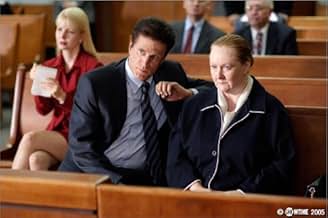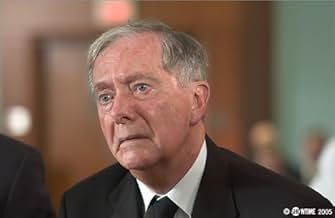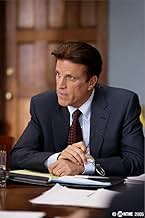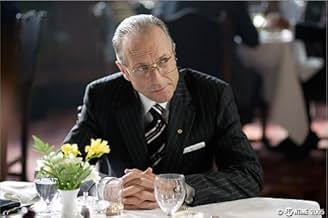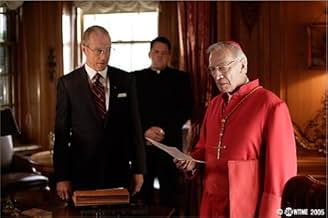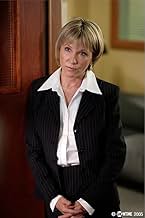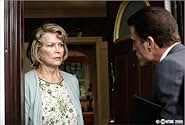AVALIAÇÃO DA IMDb
7,2/10
593
SUA AVALIAÇÃO
Adicionar um enredo no seu idiomaA dramatized account of the hidden sexual abuse and scandal that shook the foundation of the Catholic Church, and the characters, events, and policies that brought the abuse and scandal into... Ler tudoA dramatized account of the hidden sexual abuse and scandal that shook the foundation of the Catholic Church, and the characters, events, and policies that brought the abuse and scandal into existence.A dramatized account of the hidden sexual abuse and scandal that shook the foundation of the Catholic Church, and the characters, events, and policies that brought the abuse and scandal into existence.
- Direção
- Roteiristas
- Artistas
- Indicado para 2 Primetime Emmys
- 8 indicações no total
James Aaron Oliver
- Patrick McSorley
- (as James Oliver)
- Direção
- Roteiristas
- Elenco e equipe completos
- Produção, bilheteria e muito mais no IMDbPro
Avaliações em destaque
"Our Fathers", which is based on the book by David France, deserves an epic-size treatment of the sexual abuse of children by some clergy members within the Boston Archdiocese and the politics within the Catholic Church on this matter.
The movie is not as powerful as it could have been. That is not to say screenwriter Thomas Michael Donnelly and veteran director Dan Curtis (Dark Shadows, The Winds of War, War and Remembrance) totally failed. The scenes of abuse were handled with great sensitivity, they were not gratuitous or exploitive.
There are some very heartbreaking moments which include Ellen Burstyn as the mother of seven children who were all abused by one priest. Burstyn only appears in the film for only a few minutes but she makes the most of her scenes. (Update: If the group that awards the Emmys wanted to nominate a short but powerful performance by Burstyn, it should have been this one not the 14 second performance in Mrs. Harris. But I digress.)
Also of note, Chris Bauer who plays Olan Horne, one of the victims. He has a scene in which he is taunted by a couple of insensitive men at a local deli. When he graphically describes to them how he was abused, I was almost in tears. Bauer was a standout.
Christopher Plummer does a good job playing Cardinal Bernard Law. It would have been very easy to play him as a caricature (which, in my opinion, is what happened with the actors who portrayed the young and adult Fr. Geoghan) and Plummer somehow gave him some sympathetic qualities which made him a bit more complex.
My main issue with the movie was the decision by the screenwriter and the director to put so much weight on the legal aspects of the case and the news media's part of reporting the story. It does not mean that those aspects of the story should be ignored. Perhaps it had more to do with the source material. Author David France covered the crisis when he was a senior editor at Newsweek.
Because of this, despite some good scenes, I thought Ted Danson performance as Mitchell Garabedian was problematic. I was unable to connect with his character because I was paying more attention to the victims and the clergy. To me, Garabedian is a secondary character who was placed in a lead role. Also, I was very unimpressed with the scenes involving the reporters at the Boston Globe. It felt like a poor imitation of "All The President's Men".
There should have been more stories about the adult victims and their families and how these abuses affected their lives. I wished they would have delved more into the politics of the Catholic Church and why the church failed the victims and the reactions of parishioners and how their faith was shaken by this controversy.
I also believe that if the movie was performed chronologically and not used flashbacks, it would have been even more powerful and effective. While watching "Our Fathers", I kept thinking about the landmark, two-part film "The Boys of St. Vincent" (1992 and 1993), which told the true story of the sexual abuse of children at a orphanage in Newfoundland, Canada. The orphanage was run by a religious community. The movies also showed how it affected the victims, their families and the abusers 15 years later.
Also, I found Brian Dennehy's performance as Father Dominic Spagnolia, the clergyman who publicly criticized Cardinal Law and the Boston Archdiocese's handling of the sexual abuse claims but also had skeletons in his own closet, fiercely charismatic and totally fearless. Dennehy has been one of my favorite actors and when he sinks his teeth into a role, watch out. However, I believe the story of Father Spagnolia deserves a movie of its own.
Overall, "Our Fathers" was well-intended but not totally successful.
The movie is not as powerful as it could have been. That is not to say screenwriter Thomas Michael Donnelly and veteran director Dan Curtis (Dark Shadows, The Winds of War, War and Remembrance) totally failed. The scenes of abuse were handled with great sensitivity, they were not gratuitous or exploitive.
There are some very heartbreaking moments which include Ellen Burstyn as the mother of seven children who were all abused by one priest. Burstyn only appears in the film for only a few minutes but she makes the most of her scenes. (Update: If the group that awards the Emmys wanted to nominate a short but powerful performance by Burstyn, it should have been this one not the 14 second performance in Mrs. Harris. But I digress.)
Also of note, Chris Bauer who plays Olan Horne, one of the victims. He has a scene in which he is taunted by a couple of insensitive men at a local deli. When he graphically describes to them how he was abused, I was almost in tears. Bauer was a standout.
Christopher Plummer does a good job playing Cardinal Bernard Law. It would have been very easy to play him as a caricature (which, in my opinion, is what happened with the actors who portrayed the young and adult Fr. Geoghan) and Plummer somehow gave him some sympathetic qualities which made him a bit more complex.
My main issue with the movie was the decision by the screenwriter and the director to put so much weight on the legal aspects of the case and the news media's part of reporting the story. It does not mean that those aspects of the story should be ignored. Perhaps it had more to do with the source material. Author David France covered the crisis when he was a senior editor at Newsweek.
Because of this, despite some good scenes, I thought Ted Danson performance as Mitchell Garabedian was problematic. I was unable to connect with his character because I was paying more attention to the victims and the clergy. To me, Garabedian is a secondary character who was placed in a lead role. Also, I was very unimpressed with the scenes involving the reporters at the Boston Globe. It felt like a poor imitation of "All The President's Men".
There should have been more stories about the adult victims and their families and how these abuses affected their lives. I wished they would have delved more into the politics of the Catholic Church and why the church failed the victims and the reactions of parishioners and how their faith was shaken by this controversy.
I also believe that if the movie was performed chronologically and not used flashbacks, it would have been even more powerful and effective. While watching "Our Fathers", I kept thinking about the landmark, two-part film "The Boys of St. Vincent" (1992 and 1993), which told the true story of the sexual abuse of children at a orphanage in Newfoundland, Canada. The orphanage was run by a religious community. The movies also showed how it affected the victims, their families and the abusers 15 years later.
Also, I found Brian Dennehy's performance as Father Dominic Spagnolia, the clergyman who publicly criticized Cardinal Law and the Boston Archdiocese's handling of the sexual abuse claims but also had skeletons in his own closet, fiercely charismatic and totally fearless. Dennehy has been one of my favorite actors and when he sinks his teeth into a role, watch out. However, I believe the story of Father Spagnolia deserves a movie of its own.
Overall, "Our Fathers" was well-intended but not totally successful.
Much credit should go to David France and Thomas Michael Donnelly for the book and screenplay for "Our Fathers." The delicate subject matter of pedophilia in the Catholic church and the years of cover-up of the abuses in the hierarchy of the Boston diocese were handled with great sensitivity.
Every note of the film rang true, which was due in large part to the stellar cast. Christopher Plummer as Cardinal Law and Brian Dennehy as Father Spagnolia were both standouts. But the smaller roles were noteworthy as well, especially the adult men who were the abuse victims. The long-term effects of the abuse were vividly conveyed by those actors, who played their roles with great feeling and conviction. Ted Danson was very effective as an attorney motivated by the pursuit of justice, as opposed to greed. Even the actor who was faced with the daunting task of playing the late Pope John Paul II was highly credible. This brilliant ensemble was led skillfully under the sensitive direction of Dan Curtis.
This could have been a run-of-the-mill, lurid made-for-television film. Instead, it was an enterprise created with integrity by all of the artists involved.
Every note of the film rang true, which was due in large part to the stellar cast. Christopher Plummer as Cardinal Law and Brian Dennehy as Father Spagnolia were both standouts. But the smaller roles were noteworthy as well, especially the adult men who were the abuse victims. The long-term effects of the abuse were vividly conveyed by those actors, who played their roles with great feeling and conviction. Ted Danson was very effective as an attorney motivated by the pursuit of justice, as opposed to greed. Even the actor who was faced with the daunting task of playing the late Pope John Paul II was highly credible. This brilliant ensemble was led skillfully under the sensitive direction of Dan Curtis.
This could have been a run-of-the-mill, lurid made-for-television film. Instead, it was an enterprise created with integrity by all of the artists involved.
It was 40 years ago when I first became disillusioned with my church. Even then I did not abandon it. I was fully involved - altar boy, seminarian, Knights of Columus - the works. It wasn't until later when the abuses by priests were disclosed, and I was doing sexual abuse investigations myself for Child Protective Services, that I finally got fed up. I sent my baptismal certificate to the military ordinate and asked to be formally excommunicated. They told me to request it in my local parish. What, from another sexually abusing priest? No, thank you. I consider myself excommunicated even if they won't give me a letter.
This film brought it all back. The only reason I do not rate it higher was the fact that there was enough information here for three films. Other than that, it was outstanding.
Ted Danson probably starred in the best role of his career, at least from my standpoint. He was great as the lawyer that took on the almighty church and brought it down. Unfortunately, the church was able to stall real reforms, and you can be sure that priests continue to abuse today.
Christopher Plummer, as Cardinal Law, was magnificent. You almost believed that he truly did not know what he was doing. Don't be fooled. He got a promotion out of the scandal he caused by hiding those pedophile priests. He is living the good life in Rome today.
Brian Dennehy was superb as Father Spags, a gay priest who spoke out against Cardinal Law and was banished because of it.
This film opened old wounds that I hoped were healed. They were opened when Cardinal Law presided at the funeral mass of Pope John II. Those who yell for Sainthood for this pope should know that he allowed Law to remain in Boston and gave him the cushy job in Rome after he was finally forced to resign. Rome knew and let it continue.
This moving was a great film that shows how absolute power corrupts.
This film brought it all back. The only reason I do not rate it higher was the fact that there was enough information here for three films. Other than that, it was outstanding.
Ted Danson probably starred in the best role of his career, at least from my standpoint. He was great as the lawyer that took on the almighty church and brought it down. Unfortunately, the church was able to stall real reforms, and you can be sure that priests continue to abuse today.
Christopher Plummer, as Cardinal Law, was magnificent. You almost believed that he truly did not know what he was doing. Don't be fooled. He got a promotion out of the scandal he caused by hiding those pedophile priests. He is living the good life in Rome today.
Brian Dennehy was superb as Father Spags, a gay priest who spoke out against Cardinal Law and was banished because of it.
This film opened old wounds that I hoped were healed. They were opened when Cardinal Law presided at the funeral mass of Pope John II. Those who yell for Sainthood for this pope should know that he allowed Law to remain in Boston and gave him the cushy job in Rome after he was finally forced to resign. Rome knew and let it continue.
This moving was a great film that shows how absolute power corrupts.
Our Fathers is a terrific movie made by Showtime depicting the Boston scandal involving pedophile priests and their effects on the children they abused so many years ago.
With an outstanding cast, the film brilliantly shows the impact on the lives of those abused and focuses on the church, in not the best of terms.
An all-star cast is headed by Ted Danson portraying the lawyer for the abused. Christopher Plummer, as Cardinal Bernard Law, and Brian Dennehy, as an accused priest-abuser turn in masterful Emmy nominated performances in supporting roles. They are just terrific but will probably cancel one another out on the Aug. 27th awards show.
Ellen Burstyn, who is at her best when she is miserable, appears in one scene as the mother of several of the victims.
The film goes all out in showing the culpability of higher ups in a major cover-up of the priest-abuse scandal. We probably haven't seen such an cover-up since Watergate.
Danson appears in the opening scene and acts as he did but in a non-comical way as TV's Becker.
The language is salty and surprising given the nature of the Catholic church. Four letter words are prevalent and unfortunately appropriate as the story goes on.
Plummer is just fabulous as Law, a guilt-ridden priest who is ready to sacrifice anyone to save his own neck. Equally good is Dennehy, who seems to be able to beat an abuse charge until his homosexuality is revealed.
Sin was never better than this.
With an outstanding cast, the film brilliantly shows the impact on the lives of those abused and focuses on the church, in not the best of terms.
An all-star cast is headed by Ted Danson portraying the lawyer for the abused. Christopher Plummer, as Cardinal Bernard Law, and Brian Dennehy, as an accused priest-abuser turn in masterful Emmy nominated performances in supporting roles. They are just terrific but will probably cancel one another out on the Aug. 27th awards show.
Ellen Burstyn, who is at her best when she is miserable, appears in one scene as the mother of several of the victims.
The film goes all out in showing the culpability of higher ups in a major cover-up of the priest-abuse scandal. We probably haven't seen such an cover-up since Watergate.
Danson appears in the opening scene and acts as he did but in a non-comical way as TV's Becker.
The language is salty and surprising given the nature of the Catholic church. Four letter words are prevalent and unfortunately appropriate as the story goes on.
Plummer is just fabulous as Law, a guilt-ridden priest who is ready to sacrifice anyone to save his own neck. Equally good is Dennehy, who seems to be able to beat an abuse charge until his homosexuality is revealed.
Sin was never better than this.
Our Fathers should have been titled more accurately as The Sins Of Our Fathers. I found this film to be a big let-down. Honesty would have given a more profound look into the lives that were destroyed, as well as the devastated families of those children that were molested and/or brutally raped. Many of these victims remained silent for decades, riddled with guilt and shame ... knowing that they would not be believed if they told the truth about these stereo-typical God-like figures that have always been held in such high regard for their holiness. Most of those that did tell ... they were thrown to the wolves, never to darken their families doorstep again. Many turned to drugs ... to escape the mental torments ... many died during those desperate escapes from reality. Many turned to suicide ... while others turned to everything but God! How could one turn to a being that would allow such evil to occur within a church ... for thousands of years?! The worse of it is that these "Men of God" preyed upon the weakest of our children ... the already abused ... the emotionally disturbed ... the disabled. They also preyed upon those same children that came to them for help ... because they were being horribly abused by another! Because that is what we were taught ... if you are in trouble ... seek out a policeman, better yet ..... a Priest! OMG ... we were so stupid! Give us a more true to life movie about this subject! Show us how these Men Of God bragged about their conquests ... and offered them to other Priests as well. The public deserves to know the whole truth! not just the tamer versions.
Você sabia?
- CuriosidadesNear the end of the film Cardinal Bernard Law, as played by Christopher Plummer watches the movie Becket, o Favorito do Rei (1964). Plummer had starred in the original London stage production of the play BECKET.
- Citações
Angelo DeFranco: Why did this happen to me?
- ConexõesFeatured in The 57th Annual Primetime Emmy Awards (2005)
Principais escolhas
Faça login para avaliar e ver a lista de recomendações personalizadas
Detalhes
- Data de lançamento
- País de origem
- Central de atendimento oficial
- Idioma
- Também conhecido como
- Our Fathers
- Locações de filme
- Empresas de produção
- Consulte mais créditos da empresa na IMDbPro
Bilheteria
- Orçamento
- CA$ 14.340.000 (estimativa)
- Tempo de duração
- 2 h 10 min(130 min)
- Cor
- Proporção
- 1.78 : 1
Contribua para esta página
Sugerir uma alteração ou adicionar conteúdo ausente



